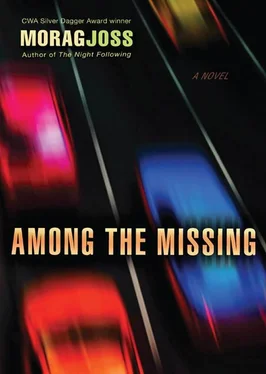“A hot, dry summer. We don’t get many of those,” I said.
“Not like we used to. Not like the summers you look back on, when you were a kid.”
I wanted to tell Ron that I never did look back on them, at least I tried not to. I wanted to tell him about the later summer, when I was thirteen, the one my father said sent my mother over the edge, though in truth the weather had had little to do with it. We both knew it had been coming for years, but we needed an additional factor, one beyond our control, to blame for an occurrence that we had failed to prevent.
It was the summer holidays, and nearly all the girls I knew from school had gone to the seaside or to visit relatives. We, of course, were staying at home.
“Here,” my mother said one afternoon, “take this on down to your dad at work. It’s just a list. A few things we need to get.” She handed me a small envelope. “Tell him I’m not up to much,” she added, as if her not doing the shopping was unusual and required explanation. Her voice sounded careful and hurting, as if there were too many bones in her throat.
She was lying on the sofa with a handkerchief balled in her hand; tears had been spouting from her eyes all day. I didn’t ask why she had put a simple shopping list in an envelope. I asked if it was her hay fever, one of several euphemisms we used to cover her various states of collapse. She said it was.
“I’m just not up to much. Stay while he reads it, you hear?” she said, with her eyes closed. “Don’t skip off. He’ll need you.” More tears trickled from under her eyelids.
“You mean I’m to stay and help carry things back? I’ll take a basket then.”
She took my hand and looked at me.
“Go now, and you’ll be down there before five. You’ll find him all right, he’s filling in for somebody on vacation in the outer office.”
I nodded. “I’ll push the bike home. He can carry the basket.”
She closed her eyes again before she let go of my hand. “I’m sorry,” she sighed. “I need some peace and quiet now. Be a good girl. Mind the road.” I put the shopping list in my pocket and left her alone.
But before I set off, I went into the bathroom, and that was when I discovered the blood between my legs. I went quietly up to my room. I knew what was happening, in theory; some of the girls in my class had already started, and one or two actually talked about it. But I felt disoriented and shy, and there was the practical problem of what to do about it. Before I could go out I needed help from my mother, and I couldn’t go to her; she was vacant and inaccessible, crying on the sofa and wanting peace and quiet. The afternoon was muffled and hot, and I realized then that warm sunshine no longer meant, and never again would mean, perfect play weather, hours and hours for swings and sandboxes and running across the grass. I would never be carefree again. The day had turned wearyingly complicated and the heat treacherous; it would make me sweat, and itch, and smell. I lay on my bed unbearably dismayed, with my hands folded over a wad of paper tissues pushed up between my thighs, and I fell asleep.
I woke less than an hour later, in a panic. It was after four o’clock and I couldn’t delay it any longer. I went in search of my mother. The house was empty. I found her hanging from a cord attached to a metal spar in the garage roof, her face black and her neck broken.
The note in the envelope in my pocket said,
Dear Gerald
Please forgive me there is nothing else I can do to keep going. It is taking me over and getting worse and worse. Thank you for everything Gerald I know it hasn’t been easy. You are a good man, you will both do better without me. She doesn’t need me any more she is not a baby any more. I can go at last. I know I am a coward but I have to let go of it all. Please try and understand it’s for the best .
Love to you both
Irene
If she ever has a baby you need to warn her, make sure she knows it can happen just out of the blue .
Just then I must have shuddered because Ron asked if I was all right and suggested stopping for a cup of coffee. I refused and said I’d gone off coffee, so I was surprised when he turned in to the car park by Netherloch bridge.
“Why are we stopping?” I asked.
He was already halfway out of the Land Rover. “You can have tea instead,” he said simply. He walked round to my side, opened the door, and held out his hand. “Come on.”
We paused on the bridge to watch the river flow underneath and widen into the loch. Three or four men moved around with buckets and bags far away down on the stones of the loch’s north shore, dark, hunched shapes under the floating veil of morning mist, but we couldn’t make out what they were doing. We walked on into the town. Set in the shade of mountains, it was a place of water and stone. Even in June there was a mineral, chilly scent from the river and loch, and the echoes of traffic and voices rang off the hard gray buildings. The main street was unspectacular, but there was an enigmatic undercurrent about it, as if it operated according to a closed, parochial logic unintelligible to all but its inhabitants. I kept noticing oddities: three strands of tinsel tied around a lamppost, an ironmonger’s shop with a basket of eggs in the window, a handwritten card on the door of the pharmacy saying, “Shona left Bermuda on the 17th.” If I had been alone, I would have been slightly unnerved, but then I heard Ron laugh, and I laughed, too, and wondered why I was taking it all so seriously.
We went into a gift shop that also had a few tables and a microwave and a sputtering coffee machine. Ron ate a massive wedge of lemon cake, but for once I wasn’t hungry. I was captivated, to begin with, by the modern hardness of the place; after the damp pinewoods and river shore and our shabby, moldering cabin, the chrome fittings of the coffee machine, the bleached counter and plate-glass window looked to me impossibly new and sharp-angled. I looked around at the girl behind the counter, and two women at another table, and none of them paid me any attention at all.
Ron looked at me. “People seeing us, they might think I’m the father,” he said.
“Does that bother you?” I asked, feeling suddenly the force of the insult to me that was implicit in how much it had bothered Col.
I didn’t mean it cunningly, but the question seemed to present Ron with layer upon layer for measurement and consideration. The answer might be strewn with implications, his silence seemed to say; whatever he replied might be a blunder. Maybe, I thought, I’d asked it mainly because all my conversations about my baby and its father had been with myself. I didn’t really need an answer for any other reason than to satisfy a thirst for words on the subject from another person, the way I might ask for a glass of water. To avoid a long fall into silence, I stood up and said we should get going, and as we walked back over the bridge and set off in the Land Rover down the opposite side of the river toward the city, we began to talk again of this and that, the weather, the way people drove, the cost of things. I pointed out a brash-looking house with a Spanish balcony and pampas grass in the garden, and Ron laughed and said he bet it was called the Hacienda.
So the miles to Inverness, our voices saying nothing in particular, the day itself: all passed along. I bought my clothes while Ron went to a hardware store, and then we had lunch in a shopping center, looking not so different from every other couple there. Ron had been given a cap in the hardware store to promote something or other, and I put it on and he burst out laughing and said I looked like a boy of seventeen. I kept it on, partly because it amused him but also because it felt so good to be lighthearted about the matter of staying unrecognized. Together we shopped in a department store for the things on the list we’d made with Silva, and Ron insisted on paying half. We arranged to drive round to the customer collection point at the back, and we even picked up leaflets about applying for the store’s charge card. By then I felt soothed by the ordinariness of our day; it made me absurdly happy to be out and behaving like everyone else.
Читать дальше












